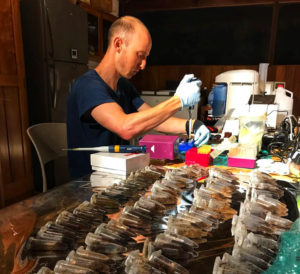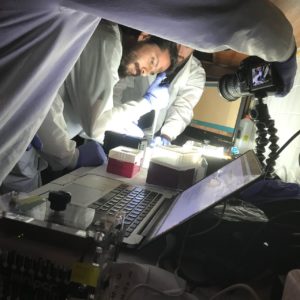This blog was written by guest blogger and 2018 Promega Social Media Intern Logan Godfrey.
Only 30 years ago, the polymerase chain reaction (PCR) was used for the first time, allowing the exponential amplification of a specific DNA segment. A small amount of DNA could now be replicated until there was enough of it to study accurately, even allowing sequencing of the amplified DNA. This was a massive breakthrough that produced immediate effects in the fields of forensics and life science research. Since these technologies were first introduced however, the molecular biology research laboratory has been the sole domain of PCR and DNA sequencing.
While an amazing revolution, application of a technology such as DNA sequencing is limited by the size and cost of DNA sequencers, which in turn restricts accessibility. However, recent breakthroughs are allowing DNA sequencing to take place in jungles, the arctic, and even space—giving science the opportunity to reach further, faster than ever before.

Gideon Erkenswick begins extractions on fecal samples collected from wild tamarins in 2017. Location: The GreenLab, Inkaterra. Photo credit: Field Projects International.
The newfound accessibility of DNA sequencing means a marriage between fields of science that were previously largely unacquainted. The disciplines of genomics and wildlife biology/ecology have largely progressed independently. Wildlife biology is practiced in the field through observations and macro-level assessments, and genomics, largely, has developed in a lab setting. Leading the charge in the convergence of wildlife biology and genomics is Field Projects International.
Field Projects International (FPI) is a non-profit organization focused on wildlife research, education and conservation. What started in 2009 as two people with an inclination to study primates, has grown into an organization that is breaking barriers in the field of wildlife science. Since its inception, FPI has hosted field projects from Peru to India, which provide students, young professionals and local scientists the opportunity to study wildlife in some of the world’s most threatened landscapes. One of FPI’s premier programs is “Genomics in the Jungle”, an aptly named program established at the Green Lab, the Amazon’s first field molecular laboratory located at the Inkaterra Guides Field Station in the Madre de Dios Department of Peru. The program brings wildlife genomics to remote areas previously untouched by this type of science. While biological and observation science has been taking place in these areas for years, the introduction of genomics to remote wildlife research is in its infancy.
“When the idea of establishing a lab in the rainforest first popped into our heads, we shot it down right away for a dozen extremely sensible reasons – power, mold, humidity, money, experience, lab space”
Mrinalini Watsa, President and Senior Research Scientist at FPI.
The list of concerns was long, but with every breakthrough comes someone or some people who look at that list as something to conquer, not fear. FPI had the vision of revolutionizing field work and bringing molecular biology out of the laboratory and into the field station. Since molecular biology and genomics research is often complex, cumbersome and expensive, the range of people who can access DNA sequencing and similar processes is limited. Using emerging technologies, FPI is changing the rule that genomics can only be done at large universities and in big cities.

Using the Oxford Nanopore MinION sequencer, a device ‘smaller than your cell-phone and able to fully sequence an entire genome’, Watsa and the other scientists at FPI can accomplish unprecedented work, even in conditions thought adverse to accurate genomics research, all while being much more cost-effective. Led by Peruvian researchers trained in-country and at the Green Lab, FPI has been able to conduct research that will facilitate the establishment of a DNA barcoding library for the region. Other projects include microbiome and parasite disease screening efforts to support local wildlife rescue centers in their goals to rehabilitate healthy wildlife back to the Amazon rainforest.
FPI also uses the Promega Quantus Fluorometer to maximize their efficiency in multi-sample sequencing. The Quantus provides rapid and highly accurate measures of DNA concentration in an environment far removed from traditional lab standardization and sanitation. The importance of accuracy and functionality cannot be overstated because an inaccurate quantitation can lead to a single sample overwhelming the sequencing process, to the detriment of others. In field work, another sample may not be readily available because the sample subject may be swinging in the trees miles away. Another sequencing round may also be out of the question, since costs limit the frequency with which you can batch-sequence samples each year. By ensuring that each step in their process is as accurate as possible, FPI works to ensure the best possible outcome for their research projects.
FPI is taking massive steps towards creating more inclusive and far-reaching science than ever before. The goal of these projects is both to allow students and researchers a chance to study and observe wildlife in these areas while pushing the boundaries of current knowledge by including genomics applications into the typical wildlife biology field session. Not only does this have profound effects on those who study there, but it also looks to shape and expand the future of science into areas previously underserved.
“Our goal has been to find such technology and bring it to areas where this complexity of research has simply never been accessible before”
Mrinalini Watsa, President and Senior Research Scientist at FPI.
While being pioneers in this field, FPI hopes that many other scientists will soon follow their example. The opportunity to bring genomics research to places never touched by this type of science can inspire a new generation scientists with possibilities, unbound by the previous rules of lab work. Watsa’s vision includes an accessibility to genomic science, previously limited by a world of factors, in which “Anyone, regardless of gender, age or educational background, can solve a problem involving DNA,”
“We hope to give them another opportunity to wonder at the world”
Mrinalini Watsa, President and Senior Research Scientist at FPI.
An increasing number of ecological and environmental concerns arise as human populations grow, habitats are destroyed and the climate warms. Expanding the reach of genomics both geographically and directly to the field will help scientists understand more quickly how best to intervene to solve critical problems of global conservation and ecology.
“I’m convinced that this is how we will ultimately solve the planet’s biggest environmental problems”
Mrinalini Watsa, President and Senior Research Scientist at FPI.
Latest posts by Promega (see all)
- Immune Surveillance Meets Innovation: The Critical Need for dsRNA Detection - April 22, 2025
- Beyond Ozempic: The New Frontier of Obesity Research - April 18, 2025
- One Health and H5N1: Promega’s Commitment to Holistic Solutions - April 8, 2025
